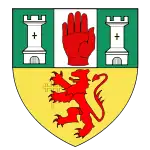Jordanstown
Jordanstown (Irish: Baile Mhic Shiúrtáin) is a townland (of 964 acres)[1] and electoral ward in County Antrim, Northern Ireland. It is within the urban area of Newtownabbey and the Antrim and Newtownabbey Borough Council area. It is also situated in the civil parish of Carnmoney and the historic barony of Belfast Lower.[1] It had a population of 6,225 in the 2011 census, with an average age of 40.[2]
| Jordanstown | |
|---|---|
 Jordanstown Location within Northern Ireland | |
| Population | 6,225 (2011 Census) |
| District | |
| County | |
| Country | Northern Ireland |
| Sovereign state | United Kingdom |
| Post town | NEWTOWNABBEY |
| Postcode district | BT37 |
| Dialling code | 028 |
| UK Parliament | |
| NI Assembly | |

Jordanstown includes a University of Ulster campus, a bowling club, a few schools and shops. It also has a beach and seafront park area called Loughshore Park, which hosts various events throughout the year including the three-day Loughshore Festival over the last weekend in August. The park sits on the shore of Belfast Lough.
Name
The place is named from an Anglo-Norman family called Jordan who accompanied John de Courcy to Carrickfergus in 1182. The surname Jordan is ultimately derived from the river Jordan, the name of which was used as a Christian name by returning crusaders who brought back Jordan water to baptise their children [Bally Jurdon 1604].[3]
History
Development
Jordanstown was a semi-rural district until the 1950s when it expanded rapidly with the construction of new housing. Middle-class families were attracted to the area due to its location adjacent to Belfast Lough and the railway station, which provides access to Belfast City Centre.
The Troubles
On 4 November 1983, 28-year-olds John Martin and Stephen Fyfe, and 29-year-old William McDonald, all members of the Royal Ulster Constabulary (RUC), were killed by a Provisional Irish Republican Army time bomb, hidden in the ceiling of a classroom, which exploded during a lecture to RUC members at the Ulster Polytechnic, Jordanstown, now a campus of Ulster University. Nuala O'Loan, in her capacity as a prison independent custody visitor (ICV), who was named Northern Ireland's first Police Ombudsman many years later, was injured in the attack, and, pregnant, lost the baby she was carrying at the time.[4][5][6]
Demography
On Census Day (27 March 2011) the usually resident population of Jordanstown was 6,225 accounting for 0.34% of the NI total.[2] Of these:
- 97.61% were from the white (including Irish Traveller) ethnic group
- 14.22% belong to or were brought up Catholic and 74.84% belong to or were brought up in a 'Protestant and other (non-Catholic) Christian (including Christian related)'
- 70.94% indicated that they had a British national identity, 11.45% had an Irish national identity and 33.80% had a Northern Irish national identity.
Transport
Jordanstown railway station was opened on 1 February 1853.
Churches
Churches in Jordanstown include St. Patrick's Church (Church of Ireland)[7] and Whiteabbey Presbyterian Church (Presbyterian).[8]
Sport
U.U.J. F.C. play association football in the Northern Amateur Football League.
Education
- Whiteabbey Primary School
- Jordanstown Schools for the Deaf and Blind.
- Thornfield House School for those with Specific Speech Impairments.[9]
- Rosstulla Special School[10]
- Monkstown Community High School[11]
- Belfast High School
- University of Ulster
Local councillors and MLAs
Jordanstown is covered by the university district electoral area of Newtownabbey Borough Council.[12]
Local Members of the Legislative Assembly (MLAs) for the area include:
Demographics
Jordanstown is a small settlement within Belfast Metropolitan Urban Area (BMUA). On Census day (29 April 2001) there were 5,494 people living in Jordanstown. Of these:
- 16.9% were under 16 years old and 48.9% were aged 60 and above
- 32.6% of the population were male and 50.5% were female
Notable people
- Stephanie Meadow (born 1992), professional golfer
- Andrew Reid (born 1994), motorcycle racer
- James Purdon Martin (1893–1984), neurologist
References
- "Jordanstown". IreAtlas Townlands Database. Retrieved 12 April 2015.
- "Census 2011 Population Statistics for Jordanstown Ward". NISRA. Retrieved 18 February 2022.
- "Placenamesni.org".
- Hattenstone, Simon (11 March 2002). "In the line of fire". The Guardian. London, UK. Retrieved 6 November 2010.
- The Telegraph article on O'Loan and the Jordanstown bombing, telegraph.co.uk; accessed 17 October 2015.
- Sutton, Malcolm. "Chronological List of Deaths: 1983". Conflict Archive on the Internet (CAIN).
- "St Patrick's Church, Jordanstown". tpatricksjordanstown.weebly.com.
- "Whiteabbey Presbyterian Church". www.whiteabbey.org. Archived from the original on 14 September 2009. Retrieved 30 October 2008.
- "Thornfield House". www.thornfieldhouseschool.co.uk. Archived from the original on 18 June 2008. Retrieved 11 January 2022.
- "Rosstulla School, Newtownabey". www.rosstulla.co.uk.
- "Monkstown Community High School". www.monkstowncommunity.org.uk. Archived from the original on 24 July 2008. Retrieved 11 January 2022.
- Jordanstown councillors
